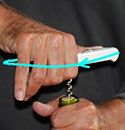Right-hand screw rule: Difference between revisions
Jump to navigation
Jump to search

imported>Paul Wormer No edit summary |
imported>Paul Wormer No edit summary |
||
| Line 1: | Line 1: | ||
{{subpages}} | |||
[[Image:Corckscrew rule.jpg|right|thumb|125px|Corkscrew driven by right hand downward into the cork.]] | [[Image:Corckscrew rule.jpg|right|thumb|125px|Corkscrew driven by right hand downward into the cork.]] | ||
The '''right-hand screw rule''', also known as '''corkscrew rule''', associates the direction of an electric current with the direction of the magnetic force lines circling the current, see [[Ampère's | The '''right-hand screw rule''', also known as '''corkscrew rule''', associates the direction of an electric current with the direction of the magnetic force lines circling the current, see [[Ampère's law]]. | ||
The corkscrew rule is depicted in the photograph, where the corkscrew is rotated downward into the cork. When the electric current runs straight downward through the center of the corkscrew, the magnetic force lines are directed along the green line shown in the photograph. | The corkscrew rule is depicted in the photograph, where the corkscrew is rotated downward into the cork. When the electric current runs straight downward through the center of the corkscrew, the magnetic force lines are directed along the green line shown in the photograph. | ||
Revision as of 09:17, 16 July 2008
The right-hand screw rule, also known as corkscrew rule, associates the direction of an electric current with the direction of the magnetic force lines circling the current, see Ampère's law.
The corkscrew rule is depicted in the photograph, where the corkscrew is rotated downward into the cork. When the electric current runs straight downward through the center of the corkscrew, the magnetic force lines are directed along the green line shown in the photograph.
